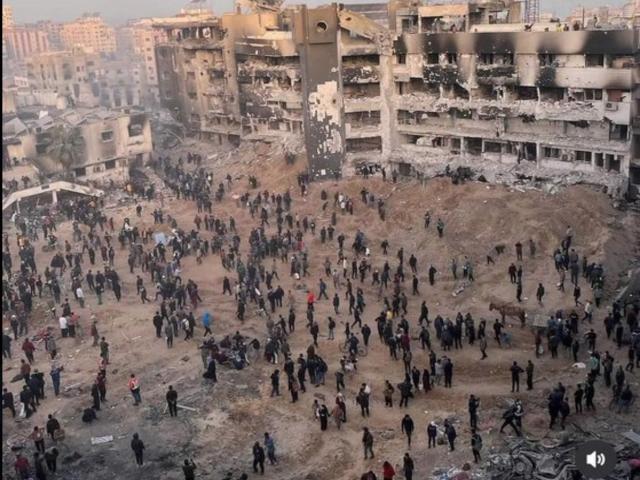In recent weeks, the Gaza Strip witnessed a significant military operation centered around al-Shifa Hospital in Gaza City, culminating in Israeli forces withdrawing after a rigorous two-week campaign. This operation, one of the most impactful in the ongoing conflict, highlights the complexities and tragedies inherent in the Israeli-Hamas confrontation.
The Israeli Defense Forces (IDF) embarked on this operation with the stated aim of neutralizing a significant threat posed by Hamas militants, who, according to Israel, had entrenched themselves within the premises of Gaza’s largest medical facility. The IDF's operation in al-Shifa was portrayed as a success by Israeli officials, claiming the elimination of over 200 militants, the arrest of hundreds, and the seizure of valuable intelligence. Weapon caches were reportedly found in highly sensitive areas within the hospital, including the maternity ward, with arms concealed in patients' beds, pillows, and even within the infrastructure of the building itself.
The IDF has now concluded its breathtakingly successful military operation in Al Shifa Hospital, in which:
— Arsen Ostrovsky 🎗️ (@Ostrov_A) April 1, 2024
🔺 200+ Hamas & PIJ terrorists killed.
🔺 500+ Terrorists captured.
🔺 6,000+ civilians evacuated.
🔺 NOT A SINGLE CIVILIAN KILLED.
These results also tear through the…
The aftermath of the operation revealed a scene of profound devastation. Al-Shifa Hospital, a critical medical facility for the Gazan population, now stands as a shadow of its former self, with significant portions of its infrastructure reduced to rubble. Much of the damage was a result of Israeli forces returning fire on militants who were using the facility as cover, believeing incorrectly that this time around, Israel would not retaliate.
The damage inflicted on the compound has rendered it inoperative, with the Hamas-led Gaza Health Ministry expressing grave concerns over the impact on Gaza's healthcare capacity. The World Health Organization, whose equipement and supplies were found throughout the vast "terror" tunnel infrastructure that Hamas built, reported the deaths of at least 21 patients during the siege, which underscores just how careful Israeli forces were given the scale of devastation to the hospital infrastructure.
In a broader strategic context, the operation at al-Shifa Hospital precedes Israel's planned offensive in Rafah, a southern Gazan city described by Israel as a remaining stronghold of Hamas militants. Israeli Prime Minister Benjamin Netanyahu outlined plans to evacuate over a million Palestinian civilians from Rafah, intending to provide aid and then target Hamas battalions. This approach reflects an effort to balance operational objectives with international humanitarian considerations.
The IDF operation at the terror base known also as Al Shifa hospital is over. IDF forces retreated and the mob are now flocking to behold the damage and destruction. Psychopaths that used patients and medical crew as human shields were eliminated. Weapons and ammunition that… pic.twitter.com/WL9gGr87rq
— Leslie Kajomovitz (@lkajomovitz) April 1, 2024
Late last year, Israel targeted Al-Shifa but gave militants over a week's warning that they were coming, providing them ample time to leave. This time, there was no warning and it seems that caught the militants off guard with many Hamas and Islamic Jihad leaders killed, and many more captured. The attack on Al Shifa was meant to ensure that those who returned after Israel left were captured before they set their sites on the last area of Gaza
Simultaneously, domestic tensions in Israel have escalated, with large-scale protests in central Jerusalem calling for a ceasefire and the resolution of the hostage crisis precipitated by Hamas' detention of Israeli citizens. The government faces mounting pressure to negotiate an end to the hostilities, even as it navigates the complexities of a conflict that has deeply affected both Israeli and Palestinian communities.
The IDF continue the fight in Shifa. Locating squads of Hamas in Al Amal and destroying tunnels pic.twitter.com/6FUEiJlqPd
— Mossad Commentary (@MOSSADil) March 30, 2024
The protests on the streets in Tel Aviv fail to recognize the reality of the situation. Israel has agreed to highly unbalanced terms in order to enact a ceasefire but Hamas, despite saying they would agree if Israel does has backtracked and refused a ceasefire. Israel has committed to doing what it takes to get the hostages home, but it is not in their control if Hamas is still refusing deals. Short of allowing Hamas to continue to exist, and releasing every Palestinian prisoner in jail, which would hand a victory to Hamas if it were done, Israel is doing what it can to get them free.
Hamas Reject Ceasefire #QatarPoliticalNews #PoliticsDay #PoliticsLife #PoliticsNews #QatarElectionNews [Video] Israel recalls its negotiating team from Qatar after Hamas rejected its latest offer in talks for a hostage deal and truce. Join our community… https://t.co/WqAy9TFqqO
— Freda Lee (@FredaLeeMNV) March 31, 2024
The situation underscores the fraught nature of the Israeli-Palestinian conflict, where military operations, civilian impacts, and the quest for security and sovereignty are intensely interwoven. As the international community watches closely, the outcomes of these operations and the broader conflict will undoubtedly have profound implications for the future of the region and the prospects for peace.


